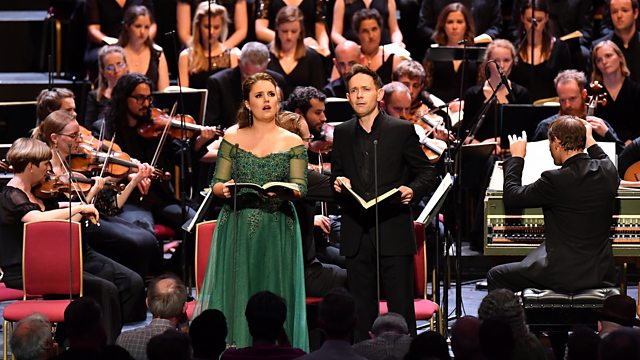
Prom 74: Handel's Theodora
Live at 91�ȱ� Proms: Handel's Theodora with Louise Alder as Theodora and Arcangelo directed by Jonathan Cohen.
Live at 91�ȱ� Proms: Handel's Theodora with Louise Alder as Theodora and Arcangelo directed by Jonathan Cohen.
Live from the Royal Albert Hall, London.
Presented by Donald Macleod
Handel Theodora
Louise Alder (soprano) Theodora
Iestyn Davies (counter-tenor) Didymus
Benjamin Hulett (tenor) Septimius
Ann Hallenberg (mezzo-soprano) Irene
Tareq Nazmi (bass) Valens
Arcangelo Chorus
Arcangelo
Jonathan Cohen (conductor)
Parts 1 and 2 (beginning)
c. 20.25 Interval: Professor Suzanne Aspden and opera director John Ramster discuss Handel's Theodora, including the staging and its 18th century context. Recorded earlier at Imperial College Union. Presented by Louise Fryer.
Parts 2 (end) and 3
In a battle between love and faith, which will triumph? Following the success of last year’s Israel in Egypt, the Proms continues its journey through Handel’s oratorios with the composer’s own favourite and one of the most powerfully dramatic works he ever produced.
An all-star cast is led by Louise Alder and Iestyn Davies as tragic lovers Theodora and Didymus. Jonathan Cohen directs his period ensemble Arcangelo.
Last on
More episodes
Next
Clip
-
![]()
Theodora: Behind Handel's Oratorio
Duration: 19:54
Music Played
-
![]()
George Frideric Handel
Theodora (Part 1)
Ensemble: Arcangelo. Conductor: Jonathan Cohen. -
![]()
George Frideric Handel
Theodora (Part 2)
Ensemble: Arcangelo. Conductor: Jonathan Cohen. -
![]()
Ralph Vaughan Williams
The Running Set arranged for two pianos
Performer: Anthony Goldstone. Performer: Caroline Clemmow.- Albion.
-
![]()
Erik Satie
Le Tango (Sports et divertissements)
Performer: Anne Queffélec.- Satie: Gymnopedies, Gnossiennes & Sports et Divertissements: Anne Queffelec.
- Virgin Classics.
Synopsis
Part 1
It is the birthday of the Emperor Diocletian, and in the occupied region of Antioch (near the modern-day border between Turkey and Syria) the Roman governor Valens commands that all subjects must give praise to the pagan gods or face death. Didymus, a young Roman officer, asks that dispensation be granted to those who, while loyal to Rome, do not worship the same gods. Valens refuses. Didymus asks his superior officer, Septimius, for help. Septimius sympathises, but the law is the law.
Meanwhile the Christian community have gathered to pray. Theodora, a princess of the royal house of Antioch, renounces worldly pleasures, thus inspiring her friend Irene. A messenger rushes in with news of Valens’s decree: the Christians choose not to flee but to trust instead in God. Septimius, arriving to enforce the order, is scornful, and when Theodora defies him he reluctantly arrests her, warning her that she will be condemned to prostitution. As she is led away she prays for death. Didymus, who is in love with Theodora, now enters and, hearing of her fate, vows to rescue her or die in the attempt.
Part 2
In the Temple of Venus the Romans are singing the praises of Flora and Venus, the goddesses of love and beauty. Valens commands Septimius to go to Theodora and see if she will submit, before continuing with his careless revelries.
Theodora is in prison. She wrestles with thoughts of death but rallies when she envisions the joy that awaits her in heaven.
Didymus reveals to Septimius that he himself is a Christian. He asks Septimius to help him gain access to Theodora’s cell, and Septimius, already uneasy about Theodora’s arrest, agrees. Didymus, his face covered, enters Theodora’s cell, where he finds her asleep. Theodora wakes with a start, but is relieved to find that it is Didymus, who urges her to change clothes with him so that she can escape. She asks rather that Didymus kill her so that she can die with her virginity intact, but he eventually persuades to her to follow his plan, and the two bid each other an emotional farewell.
Irene and the Christians keep vigil, recalling the triumph over death represented by the story of how Jesus brought back to life the son of the Widow of Nain.
Part 3
Irene sees a figure approach whom she assumes to be Didymus, but who is revealed to be Theodora in disguise. The Christians pray for Didymus’s safety, but a messenger now brings news that he is to be put to death, along with Theodora should she be recaptured. Theodora decides to give herself up for Didymus’s sake.
Valens questions Didymus, dismissing his explanations and demanding repentance or death. Theodora enters and offers herself instead. Theodora and Didymus continue to argue about who should die for the other – to the wonderment of the watching Romans – until Valens briskly declares that both will suffer. Didymus reassures the sorrowful Septimius that heaven awaits them, before joining Theodora in death. The remaining Christians pray that their faith may be no less strong.
Synopsis © Lindsay Kemp
Broadcast
- Fri 7 Sep 2018 19:0091�ȱ� Radio 3
Featured in...
![]()
More music on Radio 3—Radio 3 in Concert
We broadcast more live and specially-recorded concerts and opera than any other station.
The home of classical music and the Proms on the 91�ȱ�
Every Proms concert is broadcast live on Radio 3 - don't miss a single one.



